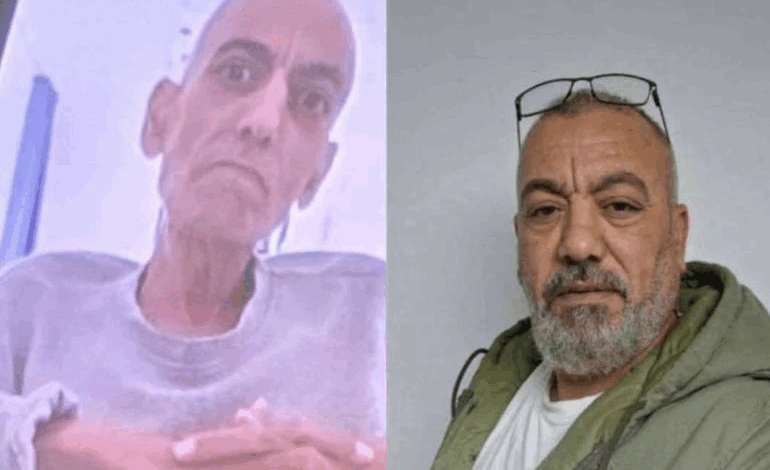Palestinian Detainee Mahmoud Abdullah Becomes 79th to Die in Israeli Prisons Amid Torture Reports

Occupied Palestine (QNN)- Palestinian detainee Mahmoud Abdullah has died in Israeli jails amid reports of torture, medical neglect, and inhumane conditions, becoming the 79th prisoner to die since October 2023.
Abduallah, 49, from the Jenin refugee camp in the occupied West Bank died months after he was imprisoned by Israeli forces in February 2025.
Following his arrest, his health deteriorated significantly. It was later discovered that he was suffering from advanced-stage cancer, according to the Palestinian Prisoner’s Society (PPS).
Despite medical confirmation of his critical condition, Israeli occupation authorities refused to release him. Before his most recent arrest, he was already struggling with health complications and undergoing treatment. His arrest prevented him from continuing vital medical care.
What We Know
The PPS said Abdullah was the 79th Palestinian known to have died in Israeli imprisonment since October 2023, noting that dozens more people have been subjected to enforced disappearances.
Since 1967, a total of 316 Palestinian prisoners have died in Israeli occupation prisons. The group said the identities of many martyrs among Gaza’s detainees remain undisclosed, as the Israeli occupation continues to conceal them, making this the “bloodiest stage in the history of the prisoner movement.”
Of those, Israel continues to withhold the bodies of 87 detainees, including 76 who died since the start of the Israeli assault.
Additionally, dozens of detainees from Gaza remain forcibly disappeared, with no confirmed information on their fate.
Israeli occupation authorities have been accused of torturing Palestinian detainees. This includes being handcuffed and shackled 24 hours a day, seven days a week – even while sleeping, eating, and using the restroom.
Testimonies also describe regular beatings by guards, extreme overcrowding, humiliation, and inadequate hygiene.
An Israeli reserve soldier exposed lately shocking abuses at Israel’s infamous Sde Teiman military base, describing it as a “sadistic torture site” where dozens of Palestinian detainees from Gaza died under brutal conditions.
The soldier described Sde Teiman as a place where “people enter alive and leave in body bags.” He said the death of detainees was no longer surprising. “The real surprise,” he added, “is if someone survives.”
He stated that Israeli occupation authorities oversee systematic abuse.
According to his account, Palestinian detainees suffered starvation, untreated war wounds, and denial of basic hygiene needs.
“Some urinated and defecated on themselves because they weren’t allowed to use the bathroom,” he said.
In August 2024, the Israeli rights group B’Tselem accused Israeli occupation authorities of systematically abusing Palestinians in “torture camps”, subjecting them to severe violence and sexual assault.
Its report, titled “Welcome to Hell”, is based on 55 testimonies from former detainees from the Gaza Strip, the occupied West Bank, East Jerusalem, and citizens of Israel. The overwhelming majority of these detainees were held without trial.
According to the Palestine Center for Prisoners Studies, more than half of the Palestinian prisoners who have died since October 2023, were killed primarily as a result of torture and abuse.
Due to the sharp rise in arrests, particularly among Gazans, Israel has opened new detention and interrogation centers operated directly by its military. According to the center, these facilities have become sites of “systematic torture and mistreatment, in clear violation of international law and human rights.”
Many prisoners from Gaza have been subjected to forced disappearance and held incommunicado under inhumane conditions, creating an environment where extrajudicial killings can occur without oversight or accountability, the center added.
In addition to torture, the center documented over 29 deaths resulting from medical negligence. Israel is reported to routinely deny prisoners access to basic medical care, holding them in unsanitary, disease-ridden conditions and delaying or outright refusing necessary treatment for extended periods. In many cases, prisoners are only transferred to hospitals when they are on the brink of death.
Recently-released Palestinians: What They Say?
As part of the Gaza ceasefire deal which took effect in early October, about 2,000 Palestinians were released from Israeli prisons, showing once again signs of torture and starvation.
The freed Palestinians said they were beaten and humiliated, describing the Israeli prisons they were held in as “slaughterhouses”.
Al Jazeera correspondent Ibrahim al-Khalili’s brother, Mohammed, who was held for more than 19 months without charge, described his ordeal as a “big struggle”.
“We were beaten and humiliated. We suffered a lot. But thank God, it’s all over now,” al-Khalili said.
Abdallah Abu Rafe described his release as a “great feeling”.
“We were in a slaughterhouse, not a prison. Unfortunately, we were in a slaughterhouse called the Ofer prison. Many young men are still there. The situation in the Israeli prisons is very difficult. There are no mattresses. They always take the mattresses away. The food situation is difficult. Things are difficult there,” he said.
Another released detainee, Yasin Abu Amra, described conditions in Israeli jails as “very, very bad”.
“In terms of the food, the oppression, and the beatings, everything was bad. There was no food or drink. I hadn’t eaten for four days. They gave me two sweets here, and I ate them,” he said.
Saed Shubair, who was also freed on Monday, said he did not know how to describe his feelings.
“The feeling is indescribable,” he said. “Seeing the sun without bars is an indescribable feeling. My hands are free from the handcuffs. Freedom is priceless.”
“It’s an indescribable feeling, a new birth,” said Mahdi Ramadan, flanked by his parents after his release from prison.
Palestinian journalist prisoner Shadi Abu Seed has given a harrowing account of life inside an Israeli prison after his release.
“I went hungry for the past two years. I swear to God, they didn’t feed us. They kept us naked. They beat us while we were naked day and night. We were tortured,” Abu Seed said.
“Until our last day in Israeli prison, they cut us and hit us and abused us. We endured every kind of torture, emotional and physical.”
“We couldn’t even sleep. They threatened us with our children. They told me they killed my children. They told us that Gaza was destroyed. I arrived here and found that everything was gone. It looked like the end of the world. Everything is different.”
“He’s been locked up for 24 years,” said a relative of Saber Masalma, who was arrested in 2002 and sentenced to life in prison. “He looks like a dead body. But we will bring him back to life,” he said.
According to Palestinian prisoner advocacy groups, every time prisoners are released, the prisoners’ bodies reflect the level of crimes committed against them, including torture that is “unprecedented” in its level after October 7, “starvation crimes, systematic medical crimes, and the infection of a number of them with scabies, in addition to the severe beatings that the prisoners were subjected to before their release.”
Signs of Severe Torture on Bodies
Over the past week, Israel released the bodies of 150 Palestinian detainees, most of whom remain unidentified. Many of the bodies show signs of severe torture, suggesting they were subjected to abuse by Israeli forces before their deaths.
According to Gaza’s Government Media Office, the bodies, dozens of which have yet to be formally identified, showed “conclusive evidence of field executions and brutal torture”.
It said the bodies showed signs of:
- Hanging and rope marks on the necks of several bodies
- Direct gunfire at close range, “confirming deliberate field executions”
- Hands and feet being bound with plastic restraints
- Eyes being blindfolded
- Being crushed under Israeli tank tracks
- Fractures, burns and deep wounds, indicating “severe physical torture”
“We call for the urgent establishment of an independent international commission of inquiry to investigate these heinous crimes and to hold Israeli leaders accountable for the war crimes committed against our people in the Gaza Strip,” the Office said.
Dr. Ismail Al-Thawabta, Director General of the Government Media Office, said Israeli occupation forces stole organs from the bodies of Palestinian detainees returned to Gaza.
He said dozens of bodies delivered near the Nasser Medical Complex in Khan Younis were found mutilated and missing vital parts, including eyes, limbs, and internal organs.
“When we examined the bodies, we found that large parts were missing, there were half bodies, bodies without heads, without limbs, without eyes, and without internal organs.”
Mohammed Zaqout, director of hospitals in Gaza’s Health Ministry, has spoken about the “clear signs of torture” found on the bodies of Palestinians that were returned to the Gaza Strip this week.
“One body shows signs of hanging with a rope still wrapped around the neck, blindfolds around the eyes and bound hands. That martyr was placed as is and sent to us,” Zaqout said from Khan Younis in southern Gaza.




